Key takeaways:
- Experiential learning involves engaging in hands-on experiences and reflecting on them for deeper understanding, as illustrated by personal encounters that challenge pre-existing assumptions.
- Journaling serves as a powerful tool for self-discovery, enhancing critical thinking, and fostering personal growth by articulating emotions and tracking behavioral patterns.
- Effective journaling techniques include establishing a routine, using prompts for inspiration, and embracing honesty to uncover valuable insights for personal transformation.
- Reflecting on journal entries helps in recognizing patterns, confronting fears, and applying insights to improve future experiences, fostering proactive growth.
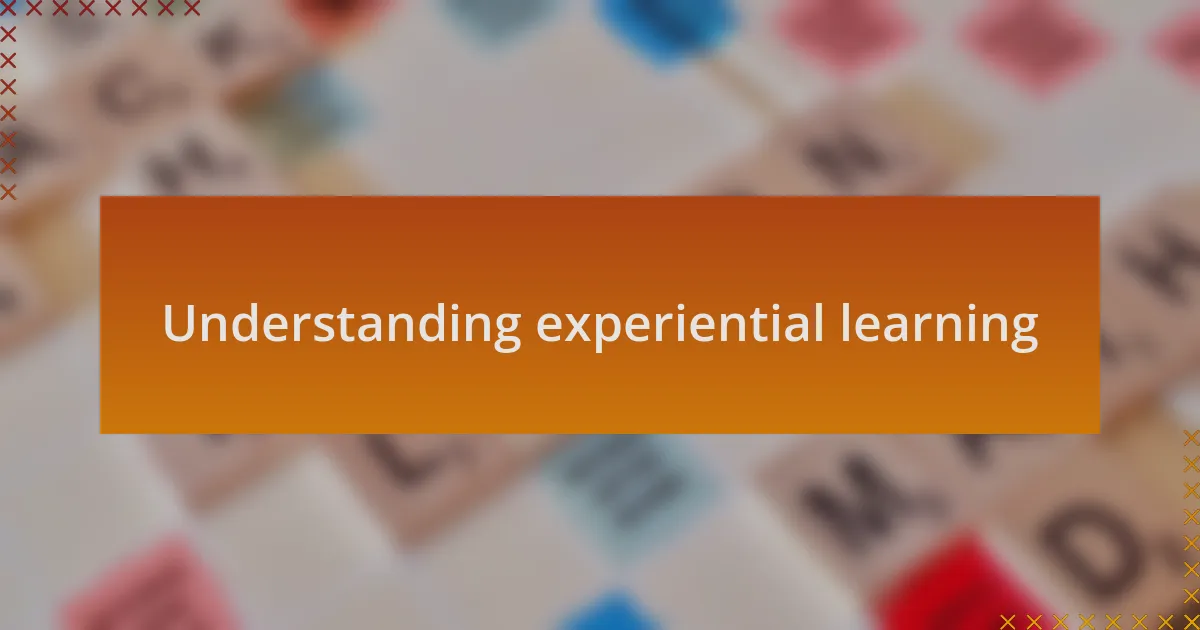
Understanding experiential learning
Experiential learning is about immersing oneself in direct experiences and reflecting on them for deeper understanding. I remember my first venture into this form of learning during a community service project. It was eye-opening to see how theory transformed into practice when I worked alongside individuals from diverse backgrounds, prompting me to reevaluate my assumptions.
Think about it: how many times have you read about a concept but never fully grasped its significance until you encountered it in real life? I’ve experienced that stark difference firsthand. There’s something powerful about learning through doing, rather than just passively consuming information. This method encourages us to engage with our surroundings, enabling us to learn from both successes and failures.
In my experience, the beauty of experiential learning lies in its adaptability. I once enrolled in a workshop that combined art and emotion, where each brushstroke became a reflection of my thoughts and feelings. This not only deepened my understanding of my creative process but also helped me recognize the emotional connections that exist in all of my learning experiences. As I’ve found, reflecting on these interactions can be just as valuable as the experiences themselves.
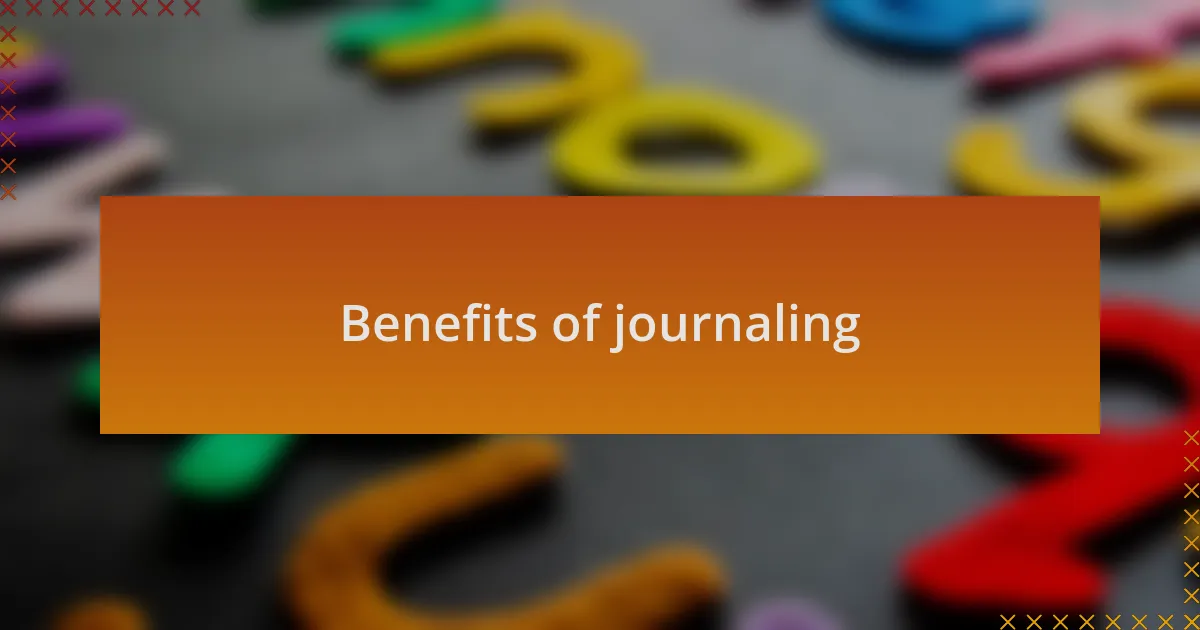
Benefits of journaling
Journaling has provided me with an incredible tool for self-discovery and clarity. After a particularly challenging day, I often find solace in pouring my thoughts onto the page. This practice not only reduces my stress, but it allows me to articulate my feelings and gain perspective on what really matters in any given situation. Have you ever noticed how writing can help clear the mental fog? It’s almost like having a conversation with myself, where I can explore emotions that often get lost in the rush of daily life.
Another significant benefit I’ve noticed is the way journaling enhances my critical thinking skills. For instance, after an intense workshop where I grappled with new ideas, I would sit down to reflect. As I wrote about my experiences, I found that I could connect dots between theories I had previously struggled to understand. Journaling serves as a bridge between what I’ve learned and how I can apply it, transforming abstract concepts into something much more tangible and relevant.
I’ve also discovered that regular journaling contributes to my personal growth in unexpected ways. Tracking my progress over time has illuminated patterns in my behavior and decision-making. I remember realizing how often I second-guessed myself—an insight that helped me make more confident choices later on. This self-awareness, fostered through writing, makes the journey of learning both enriching and deeply personal. How has journaling moved you towards self-improvement in your own life?
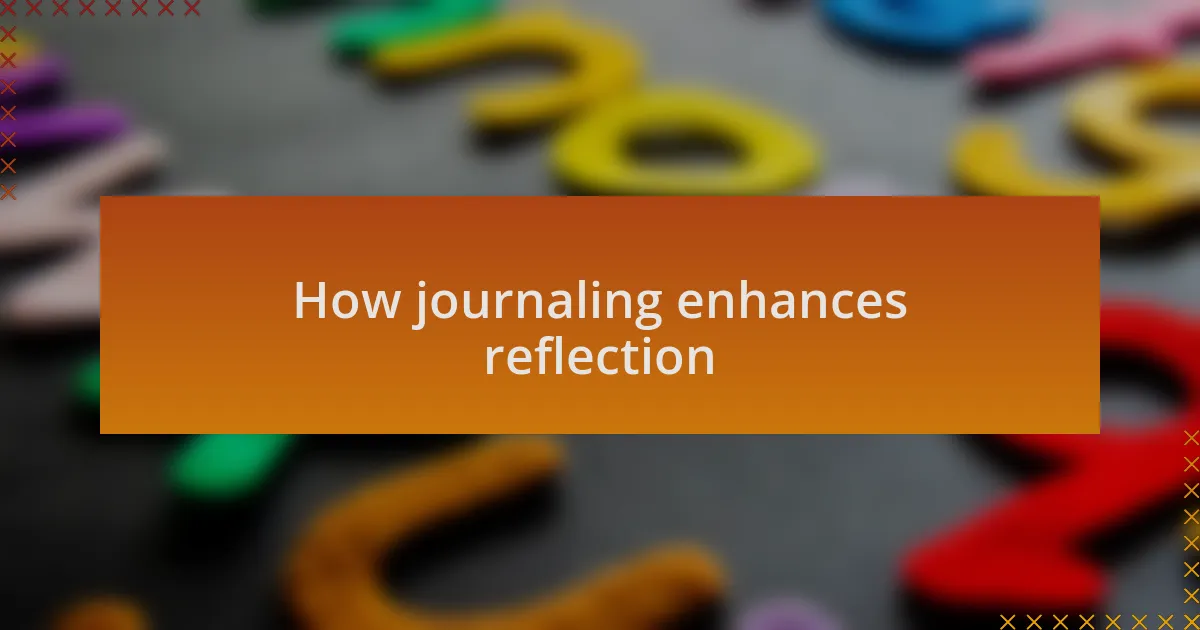
How journaling enhances reflection
Journaling deepens my reflection by creating a safe space for honesty. There have been times when I sat down feeling overwhelmed, unsure of what to write. Yet, as I allowed my thoughts to flow, I often stumbled upon realizations that surprised me, revealing motivations and feelings I wasn’t consciously aware of. Have you ever experienced that moment when ink meets paper, and suddenly, clarity shines through shadows of confusion?
The act of revisiting my entries also enhances my reflective process. I vividly recall flipping back through pages from months prior, rediscovering insights I thought I’d left behind. It’s as if I’m having a dialogue with my past self, recognizing how much I’ve grown and how my perspectives have shifted. Don’t you find it fascinating to witness your own evolution this way? This back-and-forth with my journal illuminates my learning journey, transforming past experiences into stepping stones for future growth.
Moreover, journaling cultivates a habit of mindfulness, which is crucial for reflection. I often find myself writing at the end of a long day, slowing down to process my experiences and feelings. This intentional pause allows me to engage with my thoughts meaningfully rather than merely rushing through them. How often do we take the time to truly digest our experiences? For me, journaling serves as an anchor, grounding me and helping me not just reflect, but also appreciate the lessons that life presents.
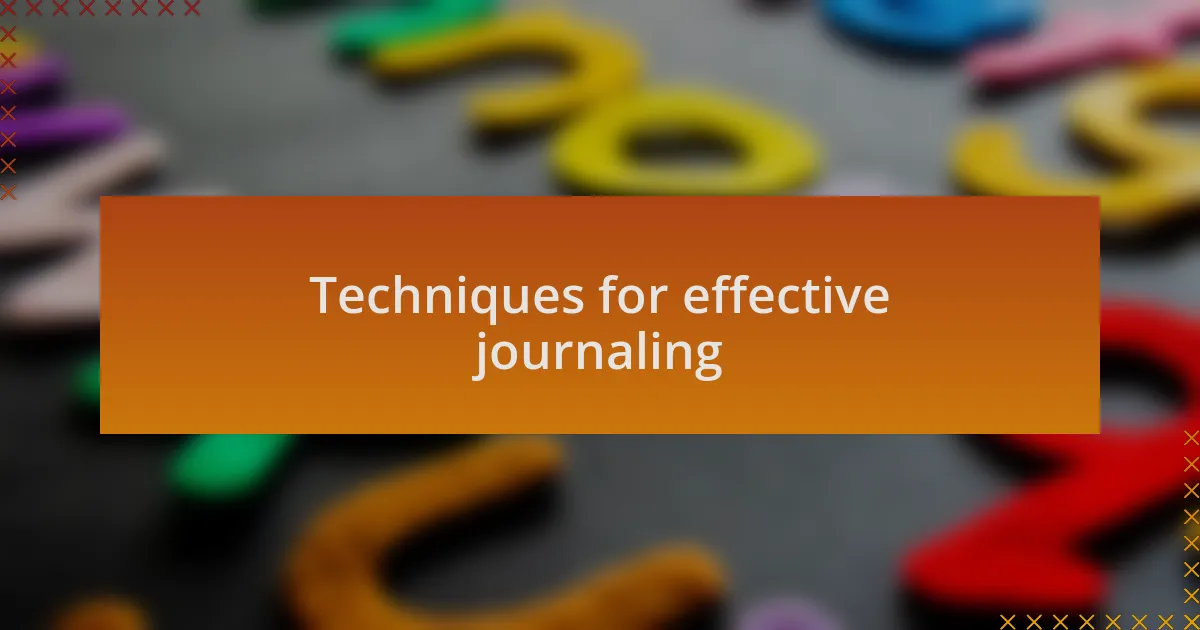
Techniques for effective journaling
One technique that has proven invaluable in my journaling practice is establishing a consistent time for writing. I’ve found that carving out just ten to fifteen minutes every morning sets a reflective tone for the day. It’s remarkable how quickly my thoughts evolve into deeper insights when I make this time a priority. Have you noticed how routines can shape your mindset? I believe creating such habits not only aids in reflection but also reinforces my commitment to personal growth.
Another strategy I frequently employ is using prompts to spark my writing. Sometimes, I sit down blankly, feeling disconnected from my thoughts. Yet, in those moments, a simple question like “What made me smile today?” can ignite a flood of memories and feelings. Isn’t it amazing how a single prompt can guide us to unexpected revelations? This method not only injects a bit of creativity but also enriches my reflections with specificity, making each entry distinctly personal.
Finally, I can’t stress enough the importance of being honest, even when it’s uncomfortable. There have been instances where I’ve hesitated to write certain truths, fearing vulnerability. However, I’ve learned that these very moments tend to hold the most valuable lessons. Reflecting on my raw emotions, even the messy ones, opens up avenues for growth I never anticipated. So, have you ever hesitated to write something real? Embracing that honesty in my journaling has proven to be a powerful catalyst for transformation.
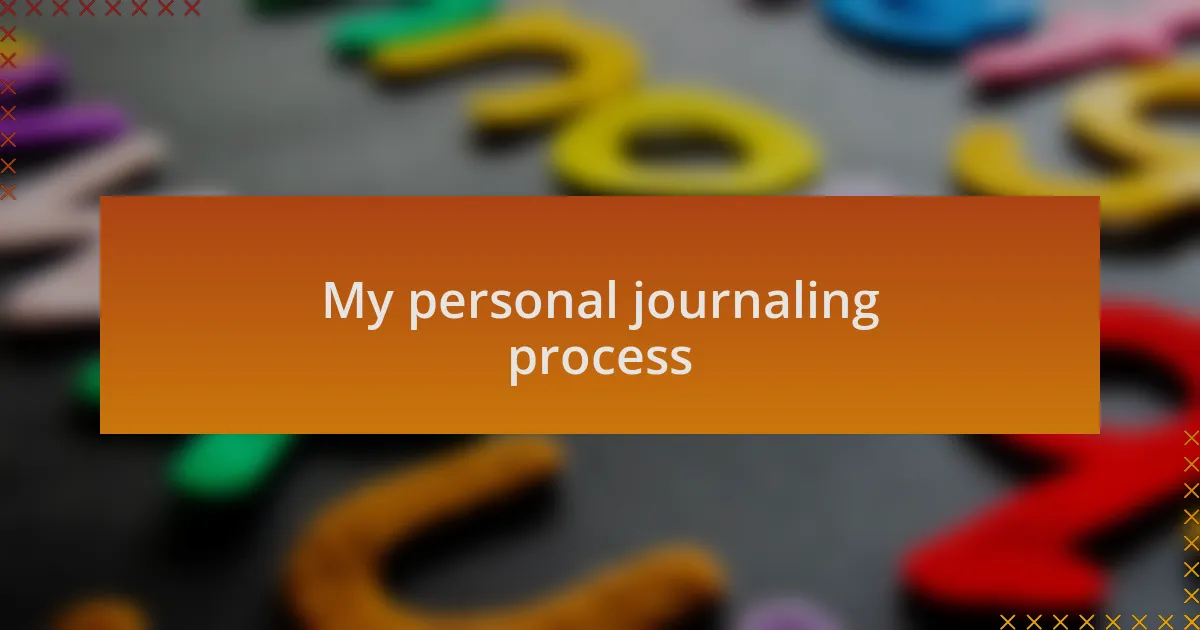
My personal journaling process
One aspect of my personal journaling process that I find particularly enriching is the way I blend structured reflection with spontaneity. For instance, I sometimes start with a structured layout, jotting down specific areas I’d like to explore, like my daily challenges or triumphs. Yet, as I write, I often allow my thoughts to flow freely, leading me to insights I hadn’t anticipated. Have you ever found that letting go of rigidity can lead to more profound reflections? This blend keeps my journaling fresh and illuminating.
Moreover, I’ve discovered that revisiting previous entries can serve as a powerful mirror to my growth. Last month, I stumbled upon a journal entry where I expressed frustration about a project at work. Reading my feelings back made me realize how far I’d come in managing workplace stress. It’s like holding a conversation with my past self. Doesn’t it feel rewarding to see how our challenges often transform into stepping stones for personal development?
Finally, I’ve embraced an approach where I incorporate gratitude into my journaling. Each week, I dedicate a section specifically to listing things I’m thankful for. This simple practice has remarkably shifted my mindset, especially during tough times. I recall a particularly challenging week when writing down just three positive moments made such a difference in how I viewed my circumstances. Isn’t it fascinating how shifting focus can change our entire perspective? This integration of gratitude reminds me each day that even in the midst of struggle, there is always something worth celebrating.
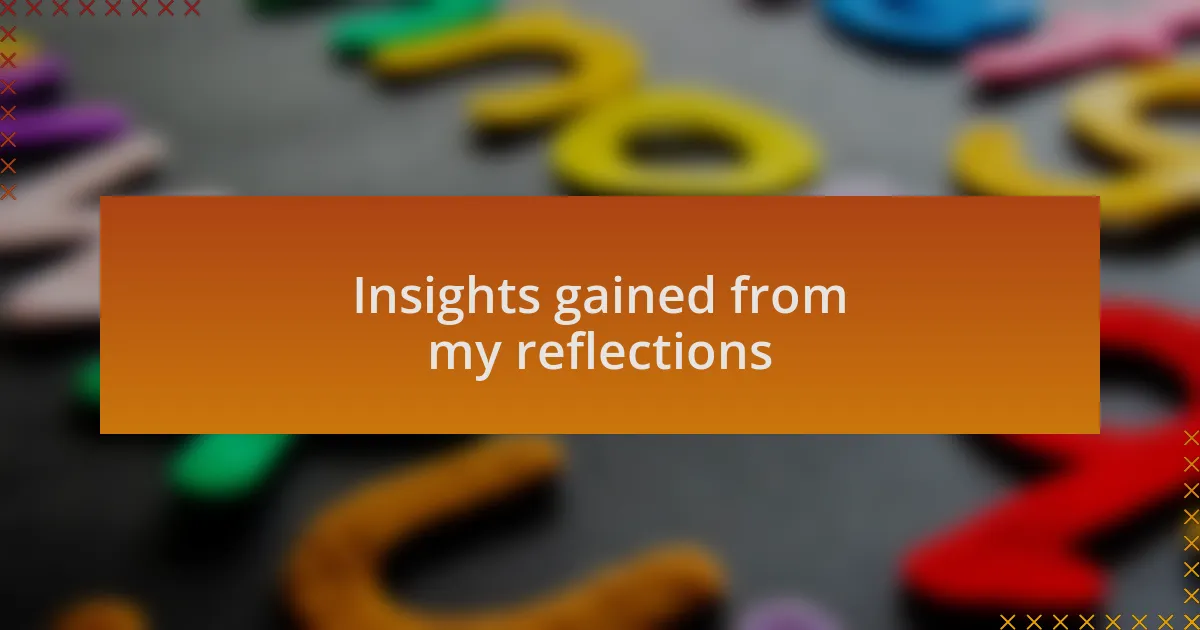
Insights gained from my reflections
Reflecting through my journaling has often uncovered surprising patterns in my behavior and emotions. Recently, I wrote about an interaction that initially felt trivial, yet upon reflection, it revealed underlying insecurities I hadn’t acknowledged. How many of us overlook the small moments that actually shape our larger emotional landscape? These insights can spark significant realizations and lead to personal breakthroughs.
In another instance, I found myself mulling over a recurring theme in my entries: a hesitation to step outside my comfort zone. This awareness prompted me to confront my fears more directly. It’s incredible how putting thoughts into words can transform abstract worries into tangible challenges. Have you ever noticed how naming a fear often diminishes its power?
Lastly, I feel that journaling fosters a deeper understanding of my emotional landscape. After a heavy day, I sometimes pour out my feelings on the page, and through this process, I often notice a shift in my mood. For example, a recent entry about feelings of overwhelm morphed into a list of potential solutions. Isn’t it remarkable how articulation can redirect emotional currents? This clarity not only enhances my self-awareness but also empowers me to take proactive steps forward.
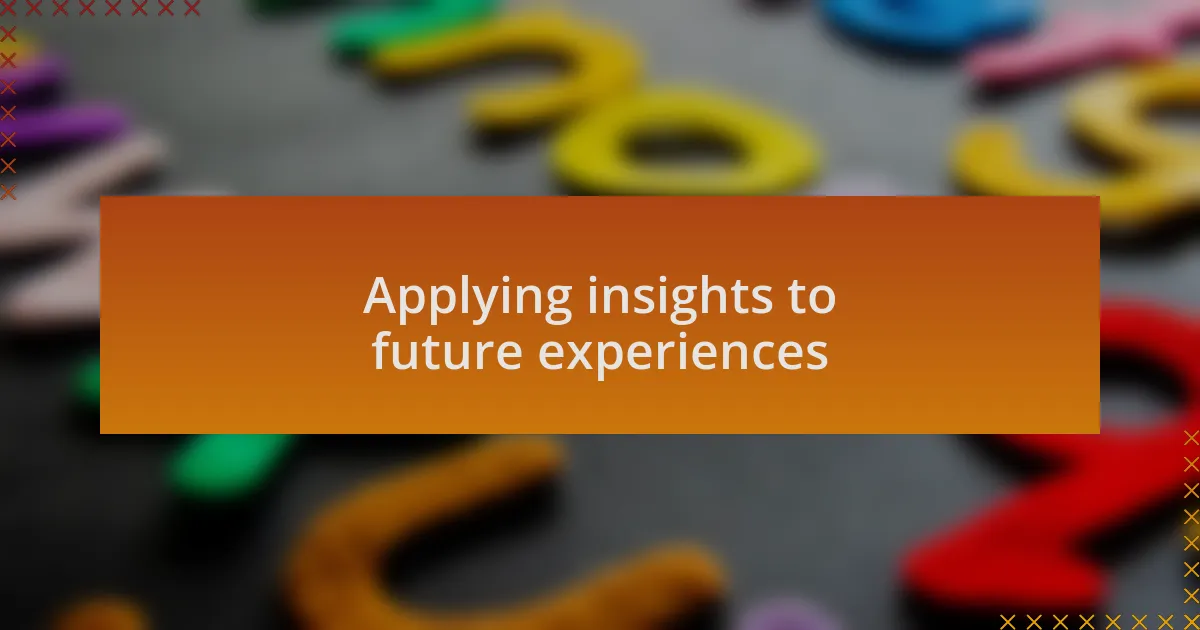
Applying insights to future experiences
Recognizing patterns in my journaling has often inspired me to apply those insights to new experiences. After reflecting on a past group project, I realized how my tendency to avoid conflict affected team dynamics. The next time I faced a similar situation, I consciously stepped up to voice my ideas, which not only fostered a more collaborative environment but also built my confidence.
I remember a time when I felt anxious about networking events; this fear surfaced repeatedly in my musings. Armed with insights from my reflections, I made a deliberate choice to approach these gatherings as opportunities for connection rather than sources of stress. As a result, I found myself engaging in meaningful conversations and even forging valuable professional relationships.
Each time I journal, it feels like I’m equipping myself for future endeavors. By transforming my reflections into actionable steps, I bridge the gap between self-awareness and experience. Have you considered how your insights could reshape your approach to similar situations? Finding this connection has made my journaling practice a catalyst for proactive growth and learning.